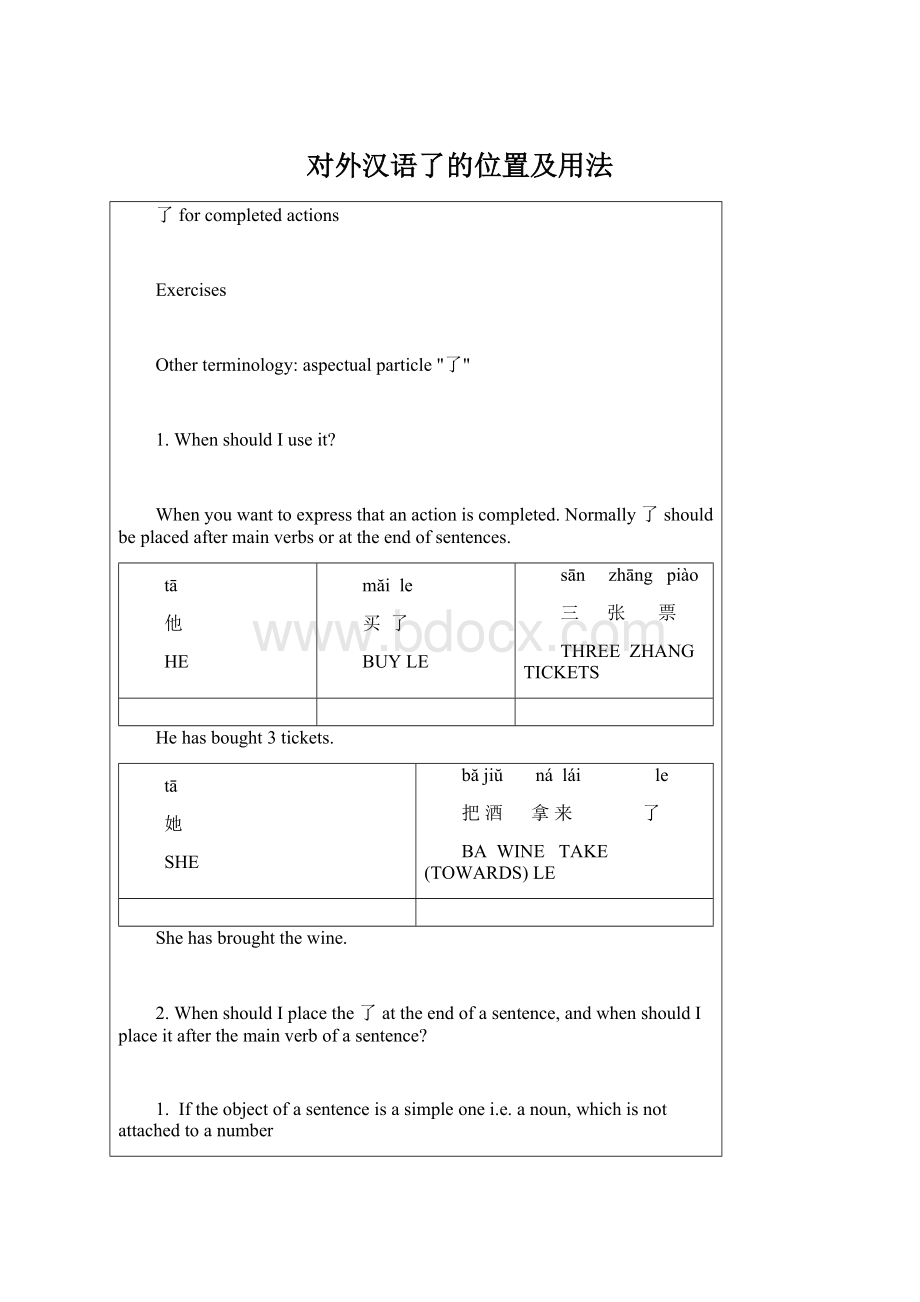对外汉语了的位置及用法.docx
《对外汉语了的位置及用法.docx》由会员分享,可在线阅读,更多相关《对外汉语了的位置及用法.docx(12页珍藏版)》请在冰豆网上搜索。

对外汉语了的位置及用法
了 forcompletedactions
Exercises
Otherterminology:
aspectualparticle"了"
1.WhenshouldIuseit?
Whenyouwanttoexpressthatanactioniscompleted.Normally 了 shouldbeplacedaftermainverbsorattheendofsentences.
tā
他
HE
măi le
买 了
BUY LE
sān zhāng piào
三 张 票
THREE ZHANG TICKETS
Hehasbought3tickets.
tā
她
SHE
bă jiŭ ná lái le
把 酒 拿 来 了
BA WINE TAKE(TOWARDS) LE
Shehasbroughtthewine.
2.WhenshouldIplacethe 了 attheendofasentence,andwhenshouldIplaceitafterthemainverbofasentence?
1. Iftheobjectofasentenceisasimpleonei.e.anoun,whichisnotattachedtoanumber
andmeasureword,andnotattachedtoadescriptiveclause(的 clause), 了 canbeplacedattheendofthesentence.Inthiscasetheparticle 了 hasmanyfunctions:
itmayindicatethecompletedaction,orachangeofsituation,itmayalsoindicateanimminentaction.
s. v. o. le
wŏmenchī fàn le
我 们 吃 饭 了.
WE EAT MEALLE
We haveeaten.. [Completedaction]
Nowweareeating. (Wedidn'teatbefore.)[Changeofsituation]
Weareabouttoeat. (我 们 要 吃 饭 了.)
3.IsitincorrectifIplace 了 aftertheverbinasimple-objectsentence?
No,itisnotincorrect,butitseemsasifthesentenceisnotyetfinished.Itmaylooklikethefirstclauseofthe verb了...就...construction.Forexample(Alsoseepattern5.),
tā chī le fàn... (jiù qùkàn diànyĭng)
他 吃 了 饭 ... (就 去 看 电 影.)
HE EAT LE MEAL... (JIUGO SEE FILM)
Afterhefinishesthemeal...(he'llgotoseeafilm.)
4.CanIplace 了 attheendofasentencethathasacomplexobject?
No.Iftheobjectofasentenceisacomplicatedone,i.e.itisprecededbyanumberwordandmeasureword,oradescriptiveclause, 了 isplacedafterthemainverbofthesentence.
s. v. le num. mw. o.
tā chī le liăng wăn fàn
他 吃 了 两 碗 饭.
HE EAT LE TWO BOWLS RICE
Hehaseatentwobowlsofrice.
5.WhereshouldIplace 了 ifasentencehasatimemeasure?
Ifanactionisattachedtoatimemeasure(e.g.,duration,lengthoftime)oranactionmeasure(e.g.,manytimes), 了 isplacedafterthemainverb.Thefollowingthreealternativepatternssharethesamefeature,thatis,theyhave 了 afterthemainverbs.
s. v. letm.(am.) de o. (le)
tā
他
HE
xué leliăngnián de zhōngwén (le)
学 了 两 年 的 中 文 (了*)
STUDY LE TWO YEAR DE CHINESE (LE)
HestudiedChinesefor2years.
s. v. o. v. le tm.(am.) (le)
tā xué zhōngwén
他 学 中 文
xué leliăngniăn(le)
学 了 两 年 (了)
o. s. v. le tm.(am.) (le)
zhōngwén tā
中 文 他
nàgediànyĭngwŏ
那个 电 影 我
xué le liăngniăn (le)
学 了 两 年 (了)
kànle liăngbiàn (le)
看 了 两 遍 (了**)
Ihavewatchedthatfilmtwice.
nà shìwŭniánqiándeshì le wŏmen shìduō nián de lăopéngyoule
那 是五 年 前 的 事 了. 我们 是 多 年 的 老 朋 友 了.
THATISFIVEYEARAGODEMATTERLE WE AREMANYYEARS DE OLDFRIEND LE
Thatincidenthappened5yearsago Wehavebeenoldfriendformanyyears.
6.Isatimemeasureplacedafter 了 inanegativesentence?
No,negativesentencesofthiskindarenormallyinadifferentwordorder.Thetime-measureshouldbeplacedbeforethenegation没.Forinstance,ifyouwanttosay:
"Ihaven'teatenChinesefoodforages."Itshouldbeinthefollowingwordorder:
s. tm. neg. v. o. le
wŏ
我
I
hăojiŭ
好 久
LONGTIME
méi 没
NOT
chī zhōngguócài le
吃 中 国 菜 了
EAT CHINESE FOOD LE
Ihaven’teatenChinesefoodforalongtime.
7.DoIhavetoputthetime-measuresbefore 没 inallnegativesentences?
No.Ifyouwanttodenyanaffirmativestatementwhichhasatime-measure,thenthetime-measureshouldbeplacedafterthemainverb.
s. neg. v. tm. o.
wŏméixuésānniánzhōngwén, wŏzhĭ xué leliăngnián
我 没 学 三 年 中 文, 我 只学 了 两 年.
I NOT LEARN 3 YEAR CHINESE, I ONLY LEARNLE 2 YEAR)
Ididn'tlearnChinesefor3years,Ionlydidfor2years.
8.DoIhavetoput 了 aftereveryverbinasentence,ifthesentencehasasequenceofactions?
Ifasequenceofactionsinthesentencearecompleted, 了 isusuallyplacedafterthelastverbofthesentence.
s. v.1 o.1 v.2 le (tm. ) o.2
tā
他
HE
qù zhōngguó 去 中 国
GO CHINA
xué le sì nián jīngjù
学 了 四 年 京 剧
STUDY LE FOURYEAR PEKINGOPERA
HewenttoChinatostudyPekingoperafor4years.
tā
他
HE
qù zhōngguó 去 中 国
GO CHINA
măi le cíqì
买 了瓷器
BUY LE CHINA
HewenttoChinaandboughtsomeChina.
Ifyouleave 了 attheendofsentences,itnormallyindicatesachangeofthesituation.Let'scomparethefollowingtwosentences:
1.(Completedaction) tāqùzhōngguóxué lezhōngwén
他去中 国 学 了中 文.
HEGO CHINA STUDYLE CHINESE
HewenttoChinaandstudiedChinese.
2.(Changeofsituation) tāqùzhōngguóxuézhōngwén le
他去中 国 学 中 文 了.
HEGO CHINA STUDYCHINESE LE
HehasgonetoChinatostudyChinese.(He'snothere)
9.DoIalwayshavetoplace 了 afterthelastverbofasentencewhendescribingasequenceofactions?
No.Thereisanothersentencepattern,whichindicatessequenceofactions,butthefirstsequenceinthesentenceisconditional.Inthissentence pattern 了 isplacedafterthefirstverbwhichisintheconditionalclause,andtheadverb 就 isplacedbeforethesecondverbofthesentence.Thiskindofconstructionhasasenseofurgency,whichmeansthattheactioninthe 就 clausetakesplaceimmediatelyafterthecompletionofthefirstaction.
s. v.1le o.1 jiuv.2 o.2
tā dàole zhōngguójiùzhăo péngyou.
他 到 了 中 国 就 找 朋 友 .
HE ARRIVELE CHINA JIU LOOKFORFRIEND
He'lllookforfriendimmediatelyafterhearrivesinChina.
Asyoucansee,thatsentencedescribestheactioninfuture,butifyouplaceanother 了 attheendofthesentence,thenitmeansthatbothactionshavetakenplace.
10.DoIalwayshavetouse 了 toindicateacompletedaction?
No,notalways.Firstofall,theparticle 了 forcompletedactionisnotusedinnegativesentences.Instead 没 shouldbeplacedbeforethemainverbofthesentence.
s.mei v. o.
tā méi chīfàn.
他 没 吃 饭.
HE NOT EATMEAL
Hedidn'teatthemeal.
11.Apartfromthenegation,arethereanycircumstancesinwhich 了 isnotused?
Inthefollowingsituationstheparticle 了 forcompletedactionsisnotused.
1.了 isnotusedforprolongedandregularactionsinthepast.Inotherwords,ifthesentencecontainswordssuchas 每天,年年,常常... theparticle 了 forthecompletedactionisnotused.
wŏyĭqián zàizhōngguójiāoshū
我以 前 在 中 国 教 书.
I INTHEPAST IN CHINA TEACH
ItaughtinChinainthepast.
qùnián wŏchángcháng gēn wŏnǚ péngyou qùkàndiànyĭng
去年 我 常 常 跟 我 女 朋 友 去 看 电 影.
LASTYEAR I OFTEN WITHMYGIRLFRIEND GOSEE FILMS
LastyearIoftenwenttoseefilmswithmygirlfriend.
2. 了 isnotusedinsentenceswhichhavemodalverbssuchas 应该, 得(dei), 可以, 能, 会, 要, 想,orforverbswhichindicatefeelingssuchas 爱,喜欢, 觉得, 知道, 愿意, 肯.
zuótiān nĭ yīnggāi qùkàn tā
昨天 你 应该 去 看 他.
YESTERDAY YOU SHOULDGOSEEHIM
Youshould'vegonetoseehimyesterday.
shíniányĭqián tā hĕn xĭihuān chī făguó cài
十年 以前 她 很 喜 欢 吃 法国 菜.
TENYEARAGO SHE VERY LIKE EATFRENCH FOOD
TenyearsagoshelikedeatingFrenchfoodverymuch.
3. 了 isnotusedwhen 是, 在, 有*arethemainverbsofsentences.
shàngxīnqī tā zài bĕijīng
上 星期 他 在 北 京.
LAST WEEK HE WAS(IN)BEIJING
HewasinBeijinglastweek.
yĭqián tā yŏu hĕn duō qián
以前 他 有 很 多 钱.
BEFORE HE HAD VERY MUCHMONEY
Inthepasthehadalotofmoney.
If 有 (toposses)isusedasthemainverbofasentence, 了(forcompletedaction)isnotused.However, 了 canbeusediftheobjectofasentenceisanabstractonewhichhasanimplicationofaction,suchas“development”,“improvement” 他的学习有了很大的进步. Hehasimprovedgreatlyinhisstudies.
4. 了 isnotusedfordirectandindirectspeeches.
dir.speech zuótiān tāwènwŏ:
"nĭ yào qùzhōngguóma"
昨天 他问 我:
"你 要 去 中 国 吗?
"
YESTERDAY HEASKME:
"YOUWANT GOCHINA MA?
"
Yesterdayheaskedme:
"WouldyouliketogotoChina?
"
indir.speech zuótiān tāwènwŏ:
yào qùzhōngguóma
昨 天 他 问 我 要 去 中 国 吗.
YESTERDAY HEASK ME WANTGO CHINA MA
YesterdayheaskedmeifIwouldliketogotoChina.
Asyoucansee,inthesituationswhent